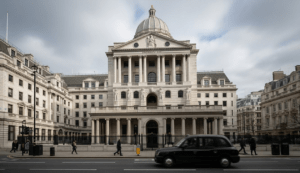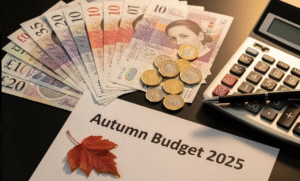UK business rates are charged on most non-domestic or commercial properties. This differs from council tax, which is charged on domestic properties. Both property taxes are ultimately decided by the respective local councils.
Businesses occupying non-domestic properties must stay informed about these rates, potential reliefs, and any obligations. Find out more about these below, including how business rates are calculated, how to make Valuation Office Agency business rates appeal, and more.
What Are Business Rates and Who Sets Them?
Business rates are a local authority levy charged on non-domestic properties (e.g., shops, offices, warehouses, and pubs). The Valuation Office Agency (VOA), part of HMRC, first assesses and sets the rateable value of a property. Local councils then use this value to determine the actual business rates bill.
The VOA is responsible for valuing all non-domestic properties in England and Wales. Currently, it values approximately 2.1 million commercial properties across the region. Business evaluations in Scotland and Northern Ireland are overseen by another property tax agencies.
Revaluations are done to ensure the rateable value will constantly reflect the property’s accurate market rental value at a given date. The most recent revaluation was performed in April 2021, effective from April 2023. Local councils ultimately decide the commercial rates.
The UK government announced in the Autumn Statement 2022 that it will provide more periodic fair revaluations and offer additional rate reliefs to support businesses. The government revenue from business rates municipal tax is used to fund local services.
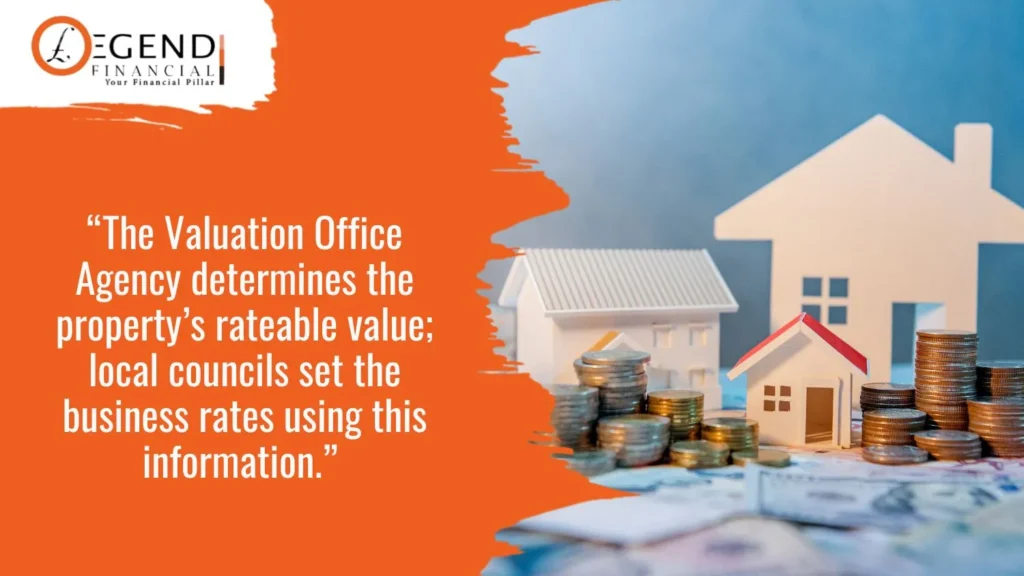
How Is Rateable Value Calculated?
The VOA works out non-domestic properties’ rateable value based on their potential annual rental value on the open market at a certain date. The agency may request rental, lease, or ownership information from property owners. It is mandatory to provide these details when asked, as all relevant properties require a valuation by law.
The agency uses these methods for assessing property rateable value:
- rental comparison
- receipts, business overheads, and other expenses
- contractor’s basis
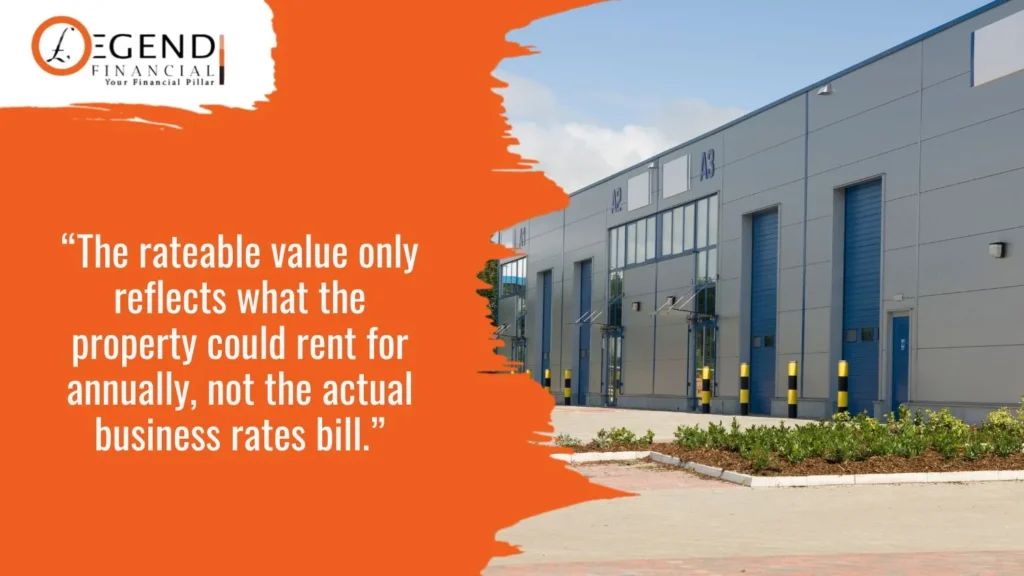
How Are Business Rates Calculated?
Local councils are responsible for calculating business rates, based on the VOA’s recent valuation report. They use the rateable value, along with a government-set multiplier and any applicable reliefs, to determine the final business rates payable by the property owner. The council then sends the tax bill to the property owner, which the latter can appeal against if they think it is wrong.
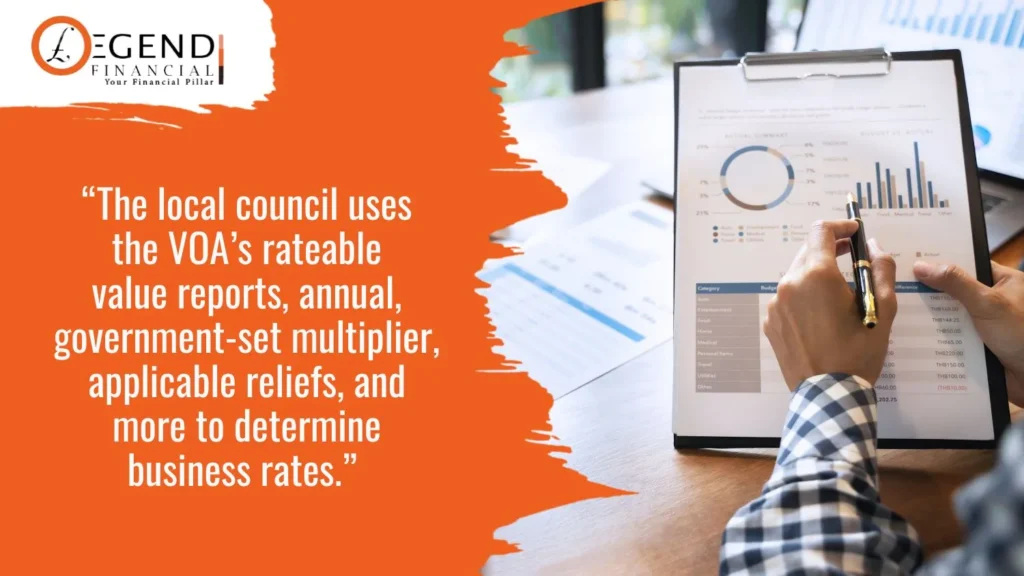
What Is Revaluation and Why Is It Done?
The VOA performs revaluation to update rateable values of non-domestic properties, ensuring that they remain fair and current, accounting for all the changes in the property market since the last tax assessment. The most recent revaluation in England and Wales took effect on 1 April 2023.
During revaluation, the VOA will most likely ask property owners for detailed information on their ownership if they think there are changes. They also revise the standard and small business multipliers, ensuring that a change in rateable property value does not necessarily equate to a change in the business rates bill. Regular updates and data collection ensure equitable and effective revaluations of a rateable property.
How to Access Rateable Value and Business Rates?
The VOA offers an online service to find the rateable value of a non-domestic property in Wales or England. Property owners can also use their Valuation Office Agency business rates login details, which include their reference number and an online key provided on their latest bill or recovery notice, to get an estimate of their business rates bill.
How to Appeal and Report Changes?
To appeal or challenge business rate assessment results, taxpayers can contact the VOA directly using their business rates valuation account, where they can update property details or dispute high valuations. If they have enquiries about their business rates bills or relief eligibility, they can contact their local council.
If they believe their business rates are incorrect, they must continue paying on their tax schedule during the property listing appeals process. Any overpayment will be refunded if the appeal is successful. Making an appeal is free, and there is no need for a representative.
Who Pays Business Rates?
Businesses that own non-domestic properties such as the following will need to pay business rates:
- warehouses
- offices
- holiday rental homes or guest houses
- factories
- shops
- pubs
- stables
Properties that are not used solely for primary residence are paid business rates tax levy, such as when property owners work at home. For instance, they live above their shop, hire people to work at their home, etc. Certain conditions exempt properties used for working at home. See below for more details.
Visit relevant article: Tax Advice for Landlords in the UK.
Who Does Not Pay Business Rates?
Some properties are exempted from the business rates, such as:
- agricultural properties and structures
- buildings used for the training or support of disabled individuals
- structures registered for public religious worship or serving as church halls
- stables where the horses are used for farming
- home-based offices where the owner uses only a small part of the home for work at home purposes, such as bedroom, and/or sells goods by post
How Do You Pay Business Rates?
Local councils send out business rates bills in February or March for the upcoming tax year. Business rates can be paid online, by phone, via direct debit, at a Post Office or Paypoint outlet, at a bank, or through BACS transfer.
Payments are typically spread over 10 months. However, the government has introduced a tax regulation to allow businesses to request a 12-month Valuation Office Agency business rates plan to help improve their cash flow. They can contact their regulatory tax council to extend the 12-month payment plan.
What Are Business Rates Reliefs?
Certain businesses in England may qualify for a reduction in their business rates bill, known as business rates relief, which can be automatic or may require an application through business rates valuation forms. The criteria and process for obtaining this relief can vary if the property is located in Scotland, Wales, or Northern Ireland.
Generally, businesses may be eligible for business rates relief if they are:
- a small business
- the only business in a rural area
- a charity or a community amateur sports club
- a local newspaper
- a retail, hospitality, and leisure property, such as shops, restaurants, entertainment venues, or hotels
Business rates relief may also apply if:
- certain improvements are made to the property
- there is reduced small business or rural rate relief after 1 April 2023
- the property is in an ‘enterprise zone’
- the property is in a ‘freeport’
- the property is a heat network
Businesses can potentially receive a temporary reduction in their rates if local disruptions, such as flooding or roadworks, affect their premises. Local councils may also offer business rates relief to businesses that provide a positive economic impact or benefit the local community.
What Are the Types of Business Rates Relief?
The most common types of business rates relief include:
- Empty Properties Business Rate Relief
If the property is empty, partly empty, or being refurbished, they are exempt from business rates for three months after becoming vacant, or six months for industrial premises.
- Local Newspapers Relief
From 1 April 2017, a discount on business rates is available for office space occupied by local newspapers for two years.
- Non-Profit and Charity Rate Relief
Non-profit organisations, charities, and amateur community sports clubs can benefit from specific rate relief options tailored to their needs.
- Hardship Relief
Local councils have the authority to reduce or remit the amount a business ratepayer is liable to pay if the business is experiencing financial hardship.
- Transitional Relief and Supporting Small Business
Transitional relief helps ratepayers facing higher bills due to revaluation, with the next revaluation scheduled for 1 April 2026.
- Retail Discount
The 2024/25 Retail, Hospitality and Leisure Business Rates Relief Scheme offers a 75% relief to eligible properties, with a cash cap limit of £110,000.
Business Rates UK FAQs
In the UK, business rates are determined by central government, which sets a multiplier value applied to the rateable value of a property.
Business rates are a tax on most commercial properties and are not subject to VAT or included in VAT returns for filing returns tax compliance.
Charities occupying non-domestic properties can receive mandatory relief from business rates if the property is used primarily for charitable purposes.
The revenue collected by local authorities is used to fund services like police, fire, and waste management, similar to the use of council tax.
How Can Legend Financial Help?
Like all the other property taxes, financial strategy and tax planning are crucial for managing Valuation Office Agency business rates. Legend Financial, a tax, accountancy, and business development firm in Stratford, Bolton, and throughout the UK London, is here to help you manage your tax affairs, especially business rates.
We will help you with all kinds of concerns you may have about your business rates, from estimating your tax bill and appealing against your rateable value to applying for exemptions and reliefs. Nothing is a difficult and complex task to us. Talk to us today!




![What is Council Tax? [2025 Guide]](https://legendfinancial.co.uk/wp-content/uploads/2023/09/LF-Blog-33-CR250210LF-ft-1-300x181.webp)




